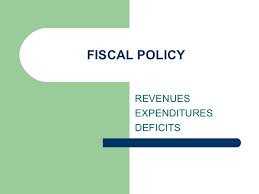Fiscal policy is that policy of the government which makes use of the tools of public revenue and public expenditure to achieve certain given objectives of the economic policy. The objectives of the economic policy, as stated above includes,
- To fasten the pace of economic development and growth.
- To ensure social justice to the people.
- To ensure equitable allocation of resources.
- To mobilise resources for investment.
- To increase the employment opportunities in the economy.
- To maintain stability in the economy by controlling inflationary and deflationary tendencies.
The objectives of the fiscal policy vary from country to country based on the nature, whether developed or developing country and also it would vary on the basis of the type of economy, that is whether it is a capitalistic, mixed or a socialistic economy.
The instruments of fiscal policy includes–
- PUBLIC REVENUE
- PUBLIC EXPENDITURE
- PUBLIC DEBT
PUBLIC REVENUE:
- The revenue generated by the government from the public comes in the form of either TAX REVENUES or NON-TAX REVENUES.
- A Tax is a compulsory charge or payment which the residents of a country are under obligation to pay to the government. It can be in the form of direct or indirect taxes.
- A direct tax is the one which is paid by the same person on whom tax is imposed. Types of direct taxes are income tax, corporate tax, wealth tax, etc. Whereas an indirect tax is the one, the burden of which is passed over to the final consumers. Examples of indirect taxes are- sales tax, excise duty, custom duty, etc.
- Non tax revenues are the revenue received by the government from sources other than tax. They can be of two types- Commercial and administrative revenues.
- Commercial revenue includes those which are generated by the government by selling goods and services that are produced by the government agencies. Eg- postage payments, toll payments, etc. Administrative revenue includes those which arise from the administrative activities of the government. Example- fines and penalties, fees, etc.
Click here for government certification in Accounting, Banking & Finance





19 Comments. Leave new
quite informative!Good job!
Informative.
Well explained!
informative 🙂
well explained…. 🙂
qyite informative …
Informative.
nice article
Informative!
Quite informative.
Informative “D
Informative…!
good job…
Good work
Very much informative……
great!
Informative!!
Aptly put, Vinita!
Fiscal policy is effective instrument through the implement action of which the government seeks to curb the supply of money in the economy, very well written , great efforts well done
Great Work!